|
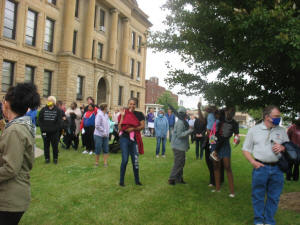
Introduction and opening prayer
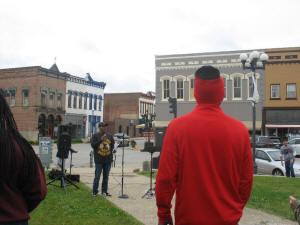
Tim Rivera welcomed everyone and said the rally was a time for
people to come together and show love, share some love, share their
stories and continue the message that all black lives matter and all
lives matter. Rivera said the night was about unity and he was glad
to see people coming together in solidarity as a community with so
much is going on in the world.
_small.jpg)
Recently retired Reverend Glenn Shelton opened with a prayer
thanking God for being our creator, help and savior and asking God
to bless the occasion. He prayed the speakers would speak with peace
and comfort but still be real.

Shelton has lived in Lincoln for 35 years and loves the town, though
he said it did not come easy. He encouraged this generation to do
things like this event because when he was their age, he didn’t
participate in them. The event lifts Shelton’s spirits and increases
his hope that there will be and continue to be unity in the
community. He quoted a Psalm where David said he would lift his eyes
to the hills because all his help comes from the Lord.
The purpose of the rally
_small.jpg)
LCHS and LC graduate Kayla Hunt spoke about the purpose and goal of
the rally. She said the purpose embodies the meaning of being a
Black American in this country, state and town. It embodies the need
for change especially relating to police brutality and the dying
need for police reform.
In speaking of reform, Hunt said reform is about making changes to
improve law enforcement and their tactics to enforce the law. There
have been countless events of unarmed black Americans being murdered
at the hands of police while conducting their everyday life. She
said this life is already not the same as for white Americans.
Black people have suffered too many deaths and inequalities, so Hunt
said we are here to bring awareness of the black community’s
struggles. These struggles stem from systemic racism that everyone
would be hearing about at the event.
Hunt asked that all would hold themselves, their friends, family,
neighbors, coworkers, city officials, school officials and business
owners accountable for their thoughts, words and behaviors. It is
time for uncomfortable conversations that will open eyes, minds and
hearts. It is time to inflict the urge upon people to change so
generations to come can see a better day.

We want justice not just when someone is looking but even when no
one is looking. Kayla said this statement was especially speaking to
our good officers. Hunt wants police officers to recognize their
voice and actions are needed.
While understanding the loyalty of the brotherhood within the police
force, Hunt asked officers to remember their oath to protect the
whole community. That means stopping brutality before it happens and
holding fellow officers accountable.
The rally’s mission was for change in the everyday life of the black
community. Hunt made a plea for equality and opportunities in
classrooms, careers and simple actions like walking down the street.
She focused on one part of the Pledge of Allegiance and had everyone
join in saying, “we are one nation under God indivisible with
liberty and justice for all.” Kayla ended by saying we demand
liberty and justice.
A History of Systematic Racism
_small.jpg)
Jennifer Hunt provided a brief history of systematic racism and
explained why police brutality is the outcome we are presented with
today. Black people have the oldest, richest and greatest history,
which is why they were hunted, kidnapped and brought to the United
States to be enslaved. It is essential to know our history to know
where we come from. If we don’t know where we come from, then we
don’t know where we are going. If we don’t know where we are going,
we don’t know where to begin and how to fix the problems we face
today.

Africans were brought to this country in 1619 to
advance the economic structure of the United States. They were
brought in to do the agricultural work in the south and textile work
in the north. Black ancestors built this country. However, Hunt said
for hundreds of years, black people were not allowed to build
economic wealth or own property.
The 13th Amendment was meant to abolish slavery, but Hunt said
slavery did not end but transformed. The 13th Amendment states
neither slavery nor involuntary servitude, except as a punishment
for crime whereof the party shall have been duly convicted, shall
exist within the United States, or any place subject to their
jurisdiction.
Hunt said that is where systematic racism began. Laws passed have
forced African Americans to a third-class status. Yet like a
phoenix, many rose from the ashes.
Black Wall Street was one of the most prosperous African American
communities in U.S. history, which Hunt said was in Tulsa, Oklahoma.
In 1921, white rioters and mobs looted, bombed, burned and
terrorized black businesses and homes. The results of this massacre
and the 1923 Rosewood Massacre crippled the black community
financially, mentally and emotionally, and left hundreds dead.
Hunt said, notably, there were no whites arrested; however, blacks
were arrested and severely punished. Throughout America’s history,
blacks have been harassed, assaulted, murdered, spit on, lynched and
imprisoned.
The Civil Rights Act of 1964 sought to end segregation in public
spaces and ban employment discrimination based on race, color,
religion or national origin. Yet, Hunt said policy makers passed
laws implementing policies counteracting these civil rights.
For the black community, Hunt said the system has been fixed and
predetermined. She said it affects the neighborhoods black people
live in, the property values of homes, the schools children attend
and the education they receive. Homes in black neighborhoods have
lower property values.
Children go to schools based on the neighborhoods they live in and
schools are funded by property taxes. Therefore, Hunt said schools
with a majority of black students receive less funding, classrooms
are overcrowded, teachers are underpaid. Schools do not have access
to high quality tutors. All of that has to do with America’s history
of systematic racism.
After the Civil War, Hunt said many government agencies redlined
neighborhoods and listed them as desirable or undesirable. For
years, black neighborhoods were prohibited from getting access to
public or private investments. Banks and insurance companies used
these maps for decades to deny people loans and other services based
solely on race.
Historically speaking, Hunt said owning a home and getting a college
education is the easiest way for American families to build wealth.
However, banks often refused black people this opportunity because
their neighborhood was redlined.
Colleges prevented students from attending through legal
segregation, so Hunt said options for higher education were scarce.
For whites, Hunt said this was not the case. White people received
low interest loans for homes and businesses and were accepted to the
top universities. Banks were willing to lend to lower income white
families rather than black upper and middle-class families. As a
result, for every $100 of wealth held by a white family, black
families have $5.04.
Though redlining is now illegal, Hunt said it still affects home
values contributing to the implicit bias and prejudice causing
systematic racism.
Even when they defeat the odds and graduate from college, Hunt said
black people do not get the same opportunities. Studies have shown
resumes with white sounding names get twice as many call backs. She
said that is why the black unemployment rate is twice as high than
the white unemployment rate.
Evidence of systematic racism is shown in every aspect of life
including wealth, incarceration, political representation, education
and police brutality.
Over the years, Hunt said many politicians have used dog-whistle
politics. Dog whistle politics is political messaging coded language
that appears to mean one thing to the general population and public
at large while simultaneously have additional or different meanings
for some subgroups. For instance, President Nixon was the first to
use the term law and order. More recently, Hunt said President Trump
has referred to himself as the law and order candidate describing
good old days when law enforcement acted a lot quicker.
The Stand Your Ground Law has kept people like Treyvon Martin from
receiving justice for being murdered.
Contracts between states and prison corporations require states to
keep prisons filled regardless of whether those occupying the cells
committed a crime. Hunt said that has devastated the black
community. The southern strategy, such as the war on drugs, has
targeted, terrorized and imprisoned blacks. Racial disparity has
created a cycle of mass incarceration that has weakened the black
community. The 1994 Crime Bill was responsible for prison expansion
and led to surge in imprisonment of blacks.
People have been encouraged to take a plea deal offering a shorter
sentence than the mandatory minimum. Hunt said it allows those being
charged for immediate release until their hearing without posting
bail. Those who choose to exercise their right to trial are punished
and sit in jail serving the mandatory minimum.
One example Hunt provided was Kalief Browder, who was wrongfully
accused of stealing a backpack and refused to take the plea deal.
Browder was sent to Ryker’s Island Jail for three years and sat in
solitary confinement for two years. Eventually the charges were
dropped, and Browder was released, but two years later he committed
suicide from suffering physical and mental abuse.
Hunt said slavery transformed to convict leasing, which transformed
to Jim Crow, which transformed to mass incarceration. The
consequences of this are still affecting access to opportunities and
the negative image of black people today. It still contributes to
false stereotypes and Hunt said these influences correlate to police
brutality experience by the black community regardless of age and
status.
The black community is looking for equality and not revenge. Hunt
said there was an entire presidential campaign based on the slogan
“Make America Great Again” but asked when America has ever been
great for the black community.
_small.jpg)
Before the next speaker, Quentin Breckenridge sang
“Lift Every Voice and Sing,” which he called the Black National
Anthem. Breckenridge said it tells where we come from and where we
are going.
Stories of discrimination and calls for unity
Several people then shared their stories and called for unity.
_small.jpg)
LCHS and LC grad Jessica Jackson said now is the time for
uncomfortable conversations. Jackson said black people are tired,
our nation is tired and is saying enough is enough. Too many people
say “but” even after seeing George Floyd’s slow, torturous murder on
every social media platform. Surrendering unarmed Michael Brown was
murdered by a police officer in cold blood and still people say
“but” he was a 6’4” black man so he is automatically a threat.
Murder is murder.
Systematic racism is diminishing the humility and humanity of black
people. Jackson asked how many more children, husbands, wives,
brothers, sisters, siblings have to be slaughtered before people of
power act. No longer should one person be the judge, jury and
executioner of a human being. Black people have been degraded,
beaten and killed publicly for centuries with no repercussions.
Black people are in a state of emergency after being killed by white
racist vigilantes. Some police officers have even killed people
sleeping in their beds.
Jackson said black lives are in danger and black people are
suffering. They are aiming for all lives matter, unity and a safe
space. When Jackson moved here her senior year, she said teachers
looked at her with disgust because she was a black girl from
Chicago, who they thought had an attitude. She recalls being told
she would never be anything or obtain a degree.
It is time to make a change and Jackson said there needs to be
accountability for officials who make remarks promoting violence.
There needs to be accountability for those who took an oath to
protect us here and across the nation.
Teachers need to step in when they hear racial slurs. People need to
stand up against racism and accept everyone. Teachers, parents,
government officials, institutions and churches need to take
accountability for silence during this movement. Jackson quoted from
Martin Luther King in saying, “In the end, we will remember not the
words of our enemies, but the silence of our friends.”
Some who spoke at last week’s protest march and rally shared their
stories of discrimination.
_small.jpg)
Nineteen-year-old Lexi Davis was raised in Lincoln and said she
often wrote essays on black lives matter in school. She was taught
limited black history that often just focused on MLK, Harriet Tubman
and Rosa Parks. Dawson wants teachers to teach more about black
history.
Last year, Davis was pulled over by an officer who followed her for
a while and was upset because she was on the phone. The officer
tried to take the phone from her. When she told him, he did not have
the right to do that, he tried to force her to get out her car and
called for back-up.
Speaking for the black people facing more time in the criminal
system than white people, Davis asked when black people will finally
get justice and when change will happen. When will people stop
having to live their lives in fear? When will a black man be able to
prove he is a changed man when being targeted? When will black
people be able to walk the streets without questions of where they
are going? When will it be enough?
_small.jpg)
Sixteen-year-old Elise Dawson said change starts with awareness.
Though Dawson’s friends make her feel loved, there are times when
she feels unloved. Racial comments even made as jokes hurt, so
Dawson said you should be aware of what you say. Dawson has also
experienced racism from her own people for the way she dresses and
for using proper language.
People should be asking themselves, “What do you
think a black person is?” Dawson asked whether it is the stereotype
some make black people out to be, or (questioning) are black people
capable of making their own path and being successful, not just
gangbangers and drug dealers.
The next question Dawson asked was if we can be
successful people with amazing careers, a town who loves us and a
long and successful marriage. Can we have a kid who wants for
nothing and a family who always backs them? Dawson was describing
her life, which she enjoys. Dawson said she is what her parents have
raised her to be: a strong black woman who has been taught by family
members not to hate, but to love.
[to top of second column] |

_small.jpg)
Karson Bonaparte attends University High School in Normal but went
to school in Lincoln from kindergarten through eighth grade. At the
schools in Lincoln, Karson said people wanted to touch his hair and
see how it felt. At U-High, he sees more diversity and is part of a
diversity committee that went to the Muhammad Ali Center to learn
what Ali went through.
U-High is big on accountability and Bonaparte said
without accountability there is no justice. He said we should hold
friends accountable for what they say and what they do. We need to
teach people better ways to handle certain situations.
_small.jpg)
Heart and Soul Café owner Sherese Johnson said what has been going
on here and across the world is a catalyst for change. She said
lyrics from the Michael Jackson song “They Don’t Really Care About
Us” still resonate 25 years after it came out. The song talks about
police brutality, being ripped of pride and being a victim of hate,
and lacking rights.
Johnson is tired or micro-aggressions and police brutality and
wonders why black lives matter and ending racism is a debate. People
of color are over-policed and too many are killed. Reform and a
change in laws is needed. Someone needs to represent black people
and care.

When people say black lives matter, Johnson said they are not saying
only black lives matter. All lives matter, but she said black lives
are the ones in danger. Johnson then referenced Luke 15 where there
are 100 sheep and one goes missing. Jesus leaves the 99 sheep to
find the one in danger.
_small.jpg)
High schooler Ava Gorens said she hears the N word as a general
slang term too often. She lives in fear for her black father’s life.
Gorens does not like walking past people hearing whispers or
watching people grab each other as if she, her brother and her
father are a danger to them. Gorens said black people have come too
far to be treated like they are a threat to the world. People should
teach kids it is terrible to hate someone for the color of their
skin.
Community leaders call for 'Action'
_small.jpg)
Lincoln College President David Gerlach said he was proud and
honored to represent the college. Underrepresented students make up
60 percent of the campus. For Gerlach, the death of George Floyd was
a tragic reminder of the bias and violence that plague our nation.
Like many, Gerlach share feelings of outrage, frustration, and
profound sadness so many Americans are experiencing. Gerlach clearly
admitted he cannot begin to understand the pain and frustration of
centuries of abuse, slavery, mistreatment, racism, Jim Crow,
redlining and slow progress. He cannot begin to understand murders
at the hand of the KKK, segregation, being followed, stopped for
suspicion because of fitting a description, fear of police and even
murder at the hands of police.
Because he does not share these experiences. Gerlach cannot say he
understands.
However, he is sad, sorry and broken, seeing some general ignorance
and hate in the community that needs to stop.

The president previously shared these thoughts with the campus
community and with media. After it was in the paper, he heard mostly
positive comments, but one person said slavery (and other problems)
never happened in his lifetime.
Historically, in 1963, black gospel singer Mahalia Jackson sang at
the college and donated the proceeds to build the Science Hall. But,
because Lincoln was a sundown town, Jackson was refused service in a
local hotel.
Today, Gerlach said Lincoln College students have been followed at
the store and heard derogatory remarks. Gerlach has heard horrible
comments about students. He said these are awesome and fantastic
students and they need opportunities.
Some students do stupid things, and for some, the stupid things they
did were assigned to their race. These students were disciplined and
sent home, which Gerlach said it is no different from any other
college.
When the college took over St. Clara’s Manor for extra housing,
Gerlach said despicable comments were made on social media about
running over students walking slowly across Ottawa Street.
Gerlach said it must stop. These students are awesome and just need
opportunity like everyone else. The community needs to embrace the
students. They spend money in the community and should be respected
not for the money they are spending, but for who they are.
Who we are
_small.jpg)
First Presbyterian Pastor Adam Quine read from Genesis 1 about
humans being created in God’s image. He also read from the Gospel of
John where Jesus told the disciples, “Peace be with you! As the
Father has sent me, so I am sending you. Then he breathed on them
and said, ‘Receive the Holy Spirit’.”
Speaking as a sibling in faith, Quine said, like everyone, he has
been created by God to breathe God. Quine said as a white male he
feels called not to speak but to listen, and is mindful of his white
privilege. He said even pastors perpetuate racism under the guise of
prayers for peace and harmony rather than proclaiming truths that
black people are still the subject of unjust laws, recipient of
unequal treatment in the judicial system and victims of sanctioned
brutality.
For too long, Quine said words have sufficed with no real commitment
to change.

Finally, we are seeing white people respond to cries for change.
Quine said it is time to listen to our black siblings as they direct
us to justice. Justice is what love looks like in public and love is
what Christians are called to be and share. Quine said it is time to
have hard conversations everywhere to get the peace God promised.
Quine asked people to repent of racism. He said we must not deny
black people’s experiences. We need to show action, speak against
racism and show love. Love does not abuse power, go into a house
unannounced, lift up symbols of white supremacy or shame people for
skin color. Love does not destroy what God has created, given breath
to and deemed very good.
For Quine’s white siblings, he said silence is no longer an option.
The Bible is full of people like Moses and Jeremiah who felt
unqualified to speak but acted in faith and promoted truth, justice
and peace. Quine said now is the time to listen to people of color
who demand we hear their cries and speak out against unfair
advantages white people have. It is time to dismantle a system that
was not right to begin with. For peace there must be justice. Quine
said it should not have taken this long for Christians to realize
black lives matter. Complacency and silence are not options.
For Quine’s white siblings, he said silence is no longer an option.
The Bible is full of people like Moses and Jeremiah who felt
unqualified to speak but acted in faith and promoted truth, justice
and peace. Quine said now is the time to listen to people of color
who demand we hear their cries and speak out against unfair
advantages white people have. It is time to dismantle a system that
was not right to begin with. For peace there must be justice. Quine
said it should not have taken this long for Christians to realize
black lives matter. Complacency and silence are not options.
_small.jpg)
Linda Rivera has seen many changes, but with George Floyd dying or
other people being shot reaching for their wallet, she realized we
have not come that far. Rivera thought of Chicago teen Emmett Till,
who was brutally beaten and killed in Mississippi for something he
allegedly said to Caroline Bryant, a white storeowner’s wife. His
body was thrown in the Tallahatchie River and his body recovered
four days later. After four days, Till looked more like an old man
than a teenager, but his mom chose an open casket so everyone could
see what happened. Years later, Bryant admitted it was a lie and
Till had not said anything derogatory. His killers were
unfortunately acquitted.
Rivera said change needs to come.
_small1.jpg)
Lincoln College History Professor and city Alderman
Ron Keller is sad to see what has happened in our country. Keller is
also glad to see the hope. He said we need to confront and eradicate
racism and work together as a community for reconciliation and
racial justice.
As a historian, Keller has studied Abraham Lincoln quite a bit.
Lincoln had to come to his own racial awareness. In 1858, Lincoln
said he was not in favor of blacks voting or serving on juries and
called the white race superior. Keller said Lincoln changed his
views on race after meeting Frederick Douglass.
Douglass had his own prejudices as a former slave and abolitionist.
Keller said Douglass had a distrust of white people. When Lincoln
and Douglass met in 1863, Keller said they put aside their
differences in ideology and position.
Lincoln did not talk about the differences in their skin color.
Keller said they worked together, stood together, breathed together
and conversed with each other not at each other.
Keller came to listen, learn and grow. He said we need to adapt and
change. Keller supports police, but accepts there is injustice and
proclaims black lives matter. Though working hard to achieve what he
has achieved, Keller knows he has white privilege. Keller said we
must work together as one body, stand together and breathe together.
When the Puritans landed almost 400 years ago, Keller said John
Winthrop’s vision for America was to make each other’s conditions
our own, rejoice together, mourn together, labor and suffer
together. We must have our eyes as a community as one and the same
body together.
Keller’s history tells him we are all equal and made in God’s image.
He said people in leadership positions need to hold themselves
accountable for their words and actions, rejecting those who seek to
divide us for their own political expediency.
Keller said we need to break ourselves out of our comfort zone and
surround ourselves with people different from us. We must stand
together, breathe together and meet hate with love, peace, justice
and understanding.
More pleas for change
_small.jpg)
Suzy Lynn Jones read a poem her niece’s friend wrote about being a
privileged white girl. Jones hoped it will help educate people. The
writer said she will never fully understand what black people feel
but will educate herself and stand with them in this tragic time.
She will hear them and see them.
The writer does not understand those who hate someone simply because
of skin color. We are all humanity, all brothers and sisters. While
the writer knows she does not have the same fears and worries of
some of her black friends, she knows what happens to some is not
right. Black people should be able to live freely and not be afraid
to leave their homes. The writer said black lives matter and those
with privilege should stand with them. She prays the hate inside of
people will heal.
_small.jpg)
Whitney Proffitt said she had heard a few were asked by some not to
speak about their experiences and was upset by that. Proffitt fears
for her biracial children. She has been educating herself about
horrible experiences black people have gone through. Proffitt is
pleading for change and asking everyone to call people out on their
racism.
_small.jpg)
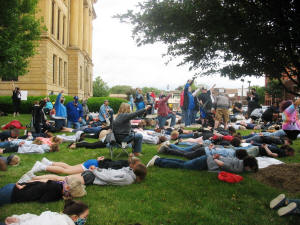
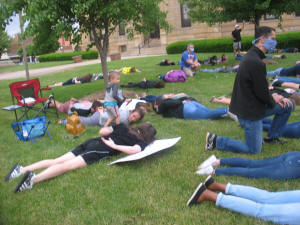
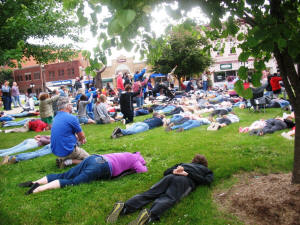
As a demonstration of what George Floyd was asked to do, Jennifer
Hunt asked those who were able to lie on the ground with their hands
behind their backs and their face on the grass or concrete. For
those unable to do that, she asked people to kneel or raise up an
arm. Then, she read a long list of names of victims of police
brutality and asked everyone to think about what Floyd and others
have gone through.
_small.jpg)
Towards the end of the evening, local singer and
songwriter Alexa Redd also read some names of those who were victims
of brutality. She wants equity and justice. Redd sang a song called
“Peace of Mind” she had written about the problem of brutality and
not judging people for their skin color.
Tim Rivera thanked everyone who spoke.
On June 19th, Jennifer Hunt said there will be a Juneteenth
celebration. The date traditionally recognizes the end of slavery in
America and celebrates the culture and achievements of African
Americans. She invited all city officials, school officials,
business owners, anyone in position of power and others to come out
to help plan and implement change. Watch LDN for further details.
_small.jpg)
The event closed with a prayer by Jeannette Harris asking God to
provide guidance, touch people’s hearts and bring racial
reconciliation. She prayed people would ask questions and turn to
God.
[Angela Reiners] |